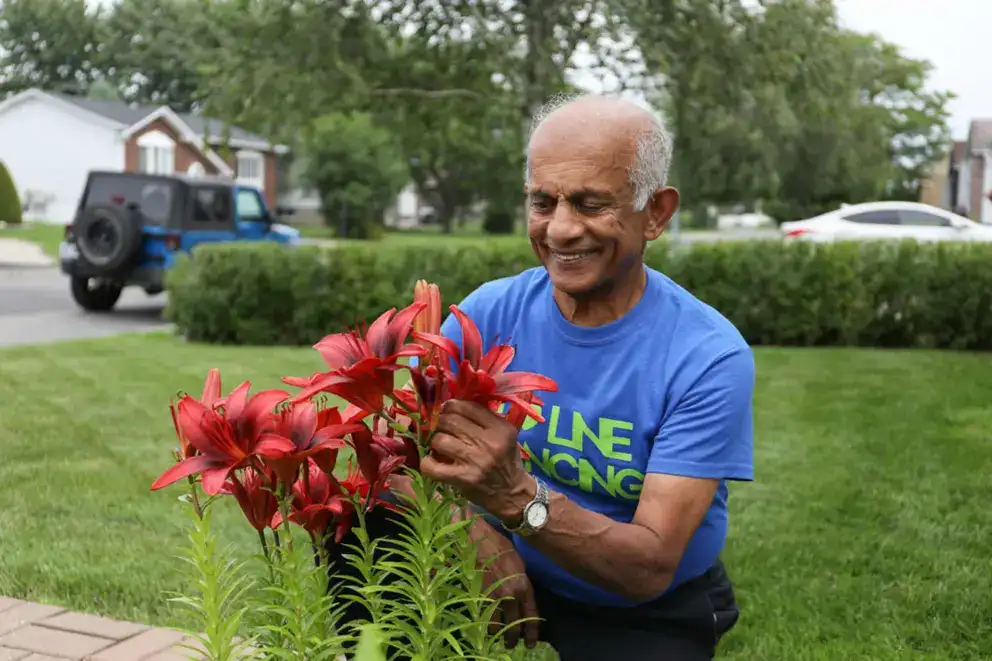Jerry Alfonso may be living with heart failure, but the active 69-year-old from St. Hubert, Que., hasn’t let the diagnosis impact his passion for travel, physical activity or volunteerism.
Jerry has learned to live with a diagnosis of heart failure after surviving two heart attacks, with the most recent leading to quadruple bypass surgery. Despite the challenges of living with a serious medical condition, he is determined to enjoy life to the fullest.
His wide range of hobbies incorporate as much activity as possible, including gardening, badminton, walking regularly and teaching several weekly line-dancing classes.
Jerry is one of 600,000 Canadians living with heart failure, a condition on the rise as more people survive heart attacks and other acute heart conditions that leave them with permanent damage.
“There is no cure, but early diagnosis, lifestyle changes and appropriate drug treatments can help you lead a normal and active life, stay out of hospital and live longer,” says Dr. Gavin Arthur, senior manager of the Promote Recovery program at Heart & Stroke.
Jerry is living proof of this. He had his first heart attack 15 years ago, but it was the second, 10 years later, that led to a diagnosis of heart failure, forcing him to re-evaluate his lifestyle.
On Easter Monday 2012, Jerry was playing badminton when he suddenly collapsed on the court. In an amazing turn of events, Jerry’s son, a volunteer first responder, used an automated external defibrillator (AED) to save his life.
Tests showed Jerry needed a quadruple bypass; his heart was only pumping at 30%. After the surgery, complications kept him in hospital for 28 days. Three months later, Jerry was given an internal defibrillator to regulate his heart rhythm.
“I had been a heart patient for the last 15 years, but after my first heart attack I went back to my normal working habits. It was now time to make some changes.”
After taking early retirement as a trade electrician from the railway, Jerry decided to follow his passion for construction and went into business doing home renovations. The second heart attack encouraged him to retire for good.
“Now, instead of focusing on construction work, I spend a lot of time online learning new line dances for my class and I do a lot of voluntary work.”
A love for activity isn’t new for Jerry. Growing up in an athletic family, he learned the value of regular exercise early, competing in track competitions and playing a variety of sports. This commitment to healthy living not only played a large part in Jerry’s recuperation, but also in his initial survival.
“My cardiologist told me that because I am physically active, this is why I survived my heart attack.”
Jerry plays badminton five nights a week and dances every Friday for two and a half hours. In addition to his active lifestyle, Jerry credits his large support network, his faith, and his medical team with his recovery.
“If I needed somebody to accompany me to go for a walk or if I needed any sort of assistance to go to a hospital appointment, I had all kinds of support. I realize that this is not the case with everybody. These are the blessings that I count on.”
Grateful for his recovery, Jerry is trying to pay it forward. He is volunteering in schools and introducing line dancing to students as a physical activity.
Jerry admits he needs to stop and take breaks from time to time, but tries to focus on his blessings rather than dwell on any physical limitations caused by the disease.
“I was not shocked when my heart attack happened,” said Jerry – whose younger sibling, parents and grandparents all died from heart disease. “I thought, ‘Ok, it’s happened, I have to change my lifestyle and focus more on being positive and appreciating what I have.’”
A keen traveller, Jerry will cross an item off his bucket list this fall — a pilgrimage to the Holy Land. “This has been one of my wishes since my heart attack, as thanksgiving for my survival.”
And his advice for other people with heart failure?
“Exercise, eat well and keep a positive attitude. Say a little prayer and live your dreams.”

